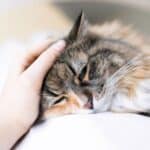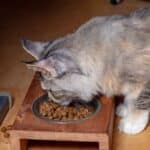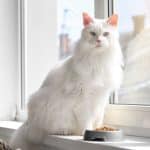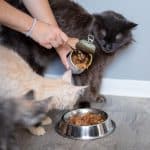They say cats are finicky eaters. I do not believe that all cats are finicky. As a fact, felines are obligate carnivores. This means that they must eat animal products to survive. How many times have you seen a cat hunt down and eat birds or mice? Felines do not need vegetables or carbohydrates of any type in order to survive. In actuality, a cat’s system can only handle a very small amount of carbohydrates.
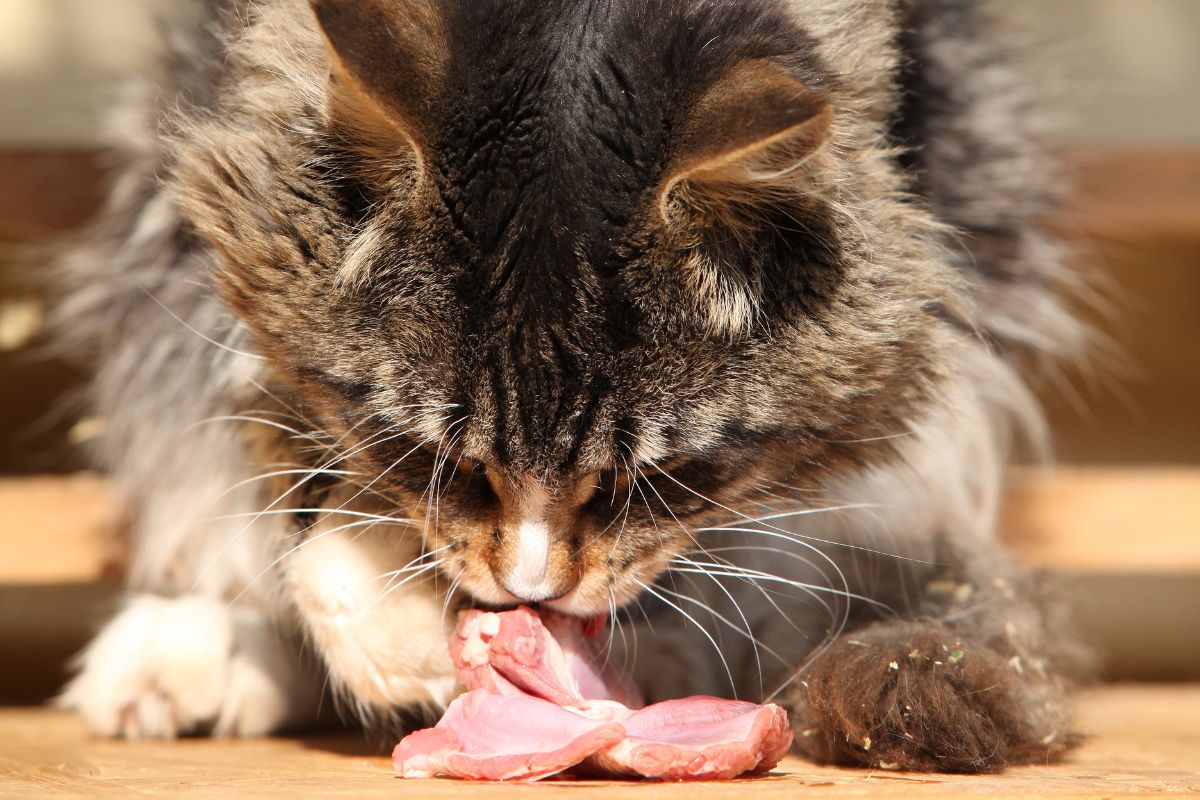
A high protein and high moisture diet is what is best for a cat. The discussion over raw foods is highly debated. Proponents state that if the food is cooked, it will eliminate some of those important nutrients and vitamins that your furry friend needs in his diet. These proponents also state that with the raw food diet, a cat’s coat is shinier, they are more agile and their teeth stay cleaner.
On the other side of the discussion remains the fact that by cooking the foods your cat eats, it will remove the dangerous pathogens and bacteria that causes great illnesses in the animal. According to science, a cat is able to digest the food in a much quicker manner than a human. Their digestive tracts are shorter and are much more acidic than humans.
The biggest concern in regards to feeding your cat a raw diet is that it can lead to cross contamination. The dangerous pathogens from that raw food will remain on the cat, around its mouth, in the feces and on all preparation surfaces.
For this reason, a domesticated cat should not be fed a diet of raw foods. The chances of these pathogens getting to the young children, the elderly and the immune compromised is too great to risk.
The black list
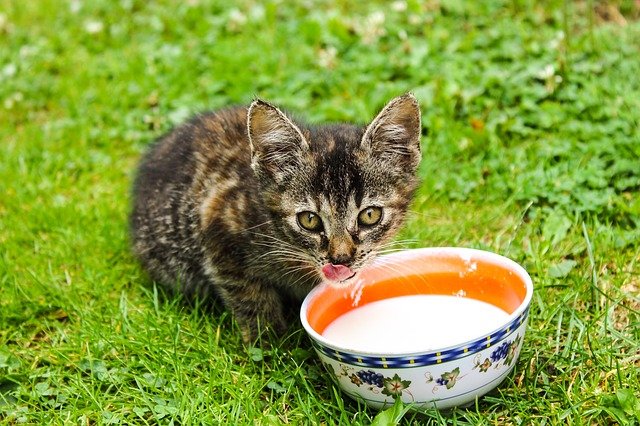
There is actually a list of foods that a cat should never eat. Some of these may surprise you. A couple of them I am sure that we are all guilty of. Let’s go through the list and explain why your cat should not eat that:
- Tuna: Yes, I know. Cats love fish and tuna is fish. How many of us have run out of cat food and resorted to opening a can of tuna for our pet? The truth is that a meal of tuna once in a great while is okay, feeding a cat tuna continuously can lead to mercury poisoning.
- Onions, Chives and Garlic: Well this seems like it would be an obvious reason, right? Well the truth is that onions can break down a cat's red blood cell count, this can lead to anemia. As to garlic and chives, these are roughly five times more dangerous to a cat than onions. They can cause health issues and lead to potentially life threatening issues to a feline.
- Milk or Dairy Products: Cat’s seem to love milk, correct? So why would it be harmful to give a cat milk or other dairy? Here is a bit of feline trivia for you, most cats are lactose intolerant. This means their digestive tract cannot handle or properly process dairy. This can lead to stomach issues such as vomiting and also diarrhea.
- Alcohol: Although many humans seem to believe that alcohol is good for them, it is in no way acceptable for a cat. The damage that is done to a human liver is also done to a feline liver. The difference is it takes much less alcohol. A five pound cat, for example, could end up in a coma or die from two teaspoons of whisky.
- Raisins and Grapes: Scientifically it is not known what causes it, however, grapes and raisins can cause kidney failure. Even just one small grape will make a cat extremely sick.
- Caffeine: As much as many of us humans love caffeine, cats can not have it. Caffeine is fatal to a feline. Caffeine poisoning symptoms include heart palpitations, restlessness, muscle tremors and rapid breathing. You need to remember that caffeine is found in ground caffeine, coffee beans, most soda and chocolate. However, there are many pain killers that also contain caffeine, as well as Red Bull.
- Chocolate: Chocolate does have caffeine as part of its make up, however, chocolate itself is highly dangerous for cats. The effects for cats that eat chocolate include: abnormal heart rhythm, seizures, tremors and death.
- Bones and trimmings of fat: These are things that most of us think would be no issue for the cats. Bones can become lodged in the mouth, throat or within the digestive tract. Fat, whether it is cooked or not will cause stomach problems, vomiting and diarrhea
- Raw eggs: Many of us have heard that raw eggs are good for the animals' fur. That is not true. Eating raw eggs can cause salmonella issues in a cat, just as it does for a human.
- Raw meat and Fish: Just as eggs can, these can cause e-coli or salmonella and become fatal to the feline. There is also an enzyme in raw fish that will destroy thiamine. A low thiamine amount can cause serious neurological issues.
- Dog Food: This is definitely not a substitute for a cat. A dog’s digestive system is different from a feline. Cat foods are made with the needs of a cat in mind.
- Liver: Now I can remember my parents feeding our barn cats the livers out of cattle and other farm animals each fall. Feeding a cat liver will cause vitamin A toxicity. This can be fatal for your feline friend.
- Treats: Most cats will do simple tricks or give nuzzles in order to receive a treat from you. Giving a treat once in a while is okay, but too much of a good thing is not a good thing. Just as feeding a cat too much food can cause obesity, diabetes and bad joints.
- Yeast Dough: Those people who love to make their own bread or rolls, know that the dough does need to sit on the counter and raise until it is double in size. This is something that you really need to keep your felines away from. The way yeast makes dough rise for bread, it will do the exact same thing inside your cat’s belly. Not only will this cause some immense pain, it can also cause alcohol poisoning when the yeast begins to ferment inside the animal.
- Human medications: These are made strictly for humans, with dosages based on many different elements. These include size, weight, age and need. Your cat will never have a need for human medicines.
How do we give our cat a healthy diet?
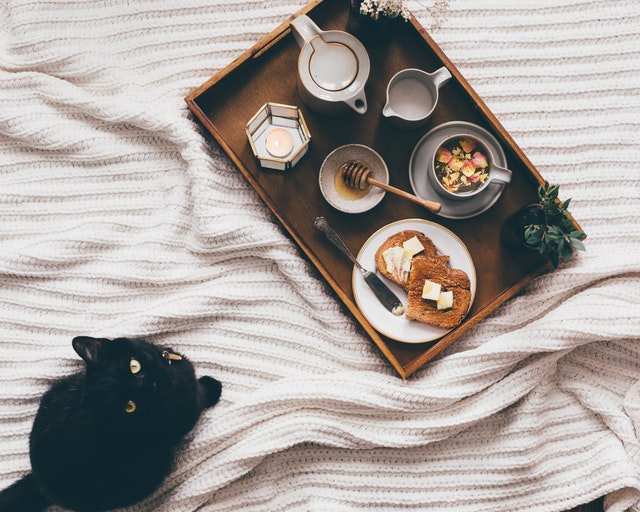
The best advice that can be given is to keep all doors closed to any cupboard or pantry that has food. If you suspect that your cat has managed to eat some prohibited foods, make a phone call to your veterinarian or an emergency vet that can check your feline out. This is the best way to show your pet that they are family and they are loved.
There are of course some raw foods that can be given to your cat. These include cooked beef or even brown rice. A little is okay once in a while, but never ever, all the time.
Raw meats that would be considered suitable would include: chicken; the necks, wings and drumsticks. Lamb shanks is one that must always be given when raw. Raw bones are okay once in a great while, cooked bones will splinter and can cause death, they could be lodged in the throat, cause a blockage or worse. Too many of the raw bones will cause constipation for a cat. So seldom would they be able to have one.
Cats prefer to eat small amounts throughout each day. They do not do well being fed one time throughout the day. They tend to overeat at one sitting and then have tummy troubles. If you give them small amounts throughout the day and keep a dish available with fresh water constantly, your cat will thrive.
Stick to the recommendations of your vet as to what and how much to feed your cats. They may try to sweet talk you into more, stay strong! It is for their health! Another possibility is to change the location of the cat's dish so that they need to exert themselves in order to get the food they want. Just as an overweight human, overweight felines need to get up and move also.
Keep in mind, treats are okay for your furry feline, just do not over do it. Sardines in a can, tuna fish from a can, both can be special treats, as long as they remain as just a treat once in a while.
It is said that like dogs, a cat may eat grass every so often. Some vets will tell you that it is done to help tummy troubles, others will tell you it is the ‘vegetable’ they are craving. Yes, cats may like to eat minor amounts of vegetables in their diet, and that is fine. Small amounts will keep your cat happy and healthy for years to come.

